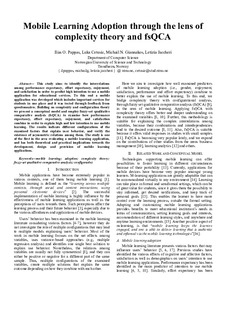| dc.contributor.author | Pappas, Ilias | |
| dc.contributor.author | Cetusic, Luka | |
| dc.contributor.author | Giannakos, Michail | |
| dc.contributor.author | Jaccheri, Maria Letizia | |
| dc.date.accessioned | 2018-03-05T11:48:23Z | |
| dc.date.available | 2018-03-05T11:48:23Z | |
| dc.date.created | 2017-09-07T16:22:59Z | |
| dc.date.issued | 2017 | |
| dc.identifier.citation | IEEE Global Engineering Education Conference, EDUCON. 2017, 536-541. | nb_NO |
| dc.identifier.issn | 2165-9559 | |
| dc.identifier.uri | http://hdl.handle.net/11250/2488557 | |
| dc.description.abstract | This study aims to identify the interrelations among performance expectancy, effort expectancy, enjoyment, and satisfaction in order to predict high intention to use a mobile application for educational services. To this end a mobile application was developed which includes important services for students in one place and it was tested through feedback from questionnaires. Building on complexity and configuration theory we present a conceptual model and employ fuzzy-set qualitative comparative analysis (fsQCA) to examine how performance expectancy, effort expectancy, enjoyment, and satisfaction combine in order to explain high and low intention to use mobile learning. The results indicate different configurations of the examined factors that explain user behavior, and verify the existence of asymmetric relations among them. The study is one of the first in the area evaluating a mobile learning application, and has both theoretical and practical implications towards the development, design and provision of mobile learning applications. | nb_NO |
| dc.language.iso | eng | nb_NO |
| dc.publisher | Institute of Electrical and Electronics Engineers (IEEE) | nb_NO |
| dc.title | Mobile learning adoption through the lens of complexity theory and fsQCA | nb_NO |
| dc.type | Journal article | nb_NO |
| dc.type | Peer reviewed | nb_NO |
| dc.description.version | acceptedVersion | nb_NO |
| dc.source.pagenumber | 536-541 | nb_NO |
| dc.source.journal | IEEE Global Engineering Education Conference, EDUCON | nb_NO |
| dc.identifier.doi | 10.1109/EDUCON.2017.7942898 | |
| dc.identifier.cristin | 1491870 | |
| dc.relation.project | Norges forskningsråd: 255129 | nb_NO |
| dc.description.localcode | © 2017 IEEE. Personal use of this material is permitted. Permission from IEEE must be obtained for all other uses, in any current or future media, including reprinting/republishing this material for advertising or promotional purposes, creating new collective works, for resale or redistribution to servers or lists, or reuse of any copyrighted component of this work in other works. | nb_NO |
| cristin.unitcode | 194,63,10,0 | |
| cristin.unitname | Institutt for datateknologi og informatikk | |
| cristin.ispublished | true | |
| cristin.fulltext | postprint | |
| cristin.qualitycode | 1 | |
